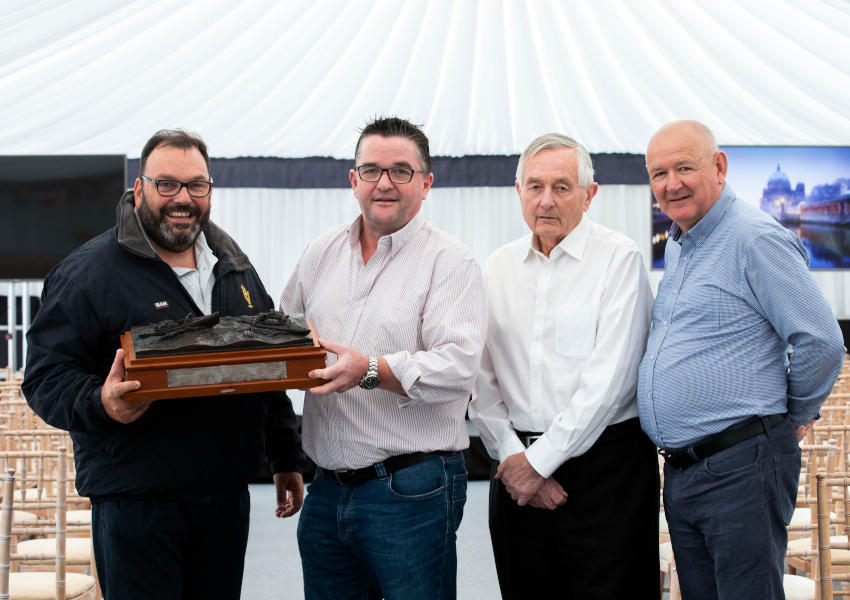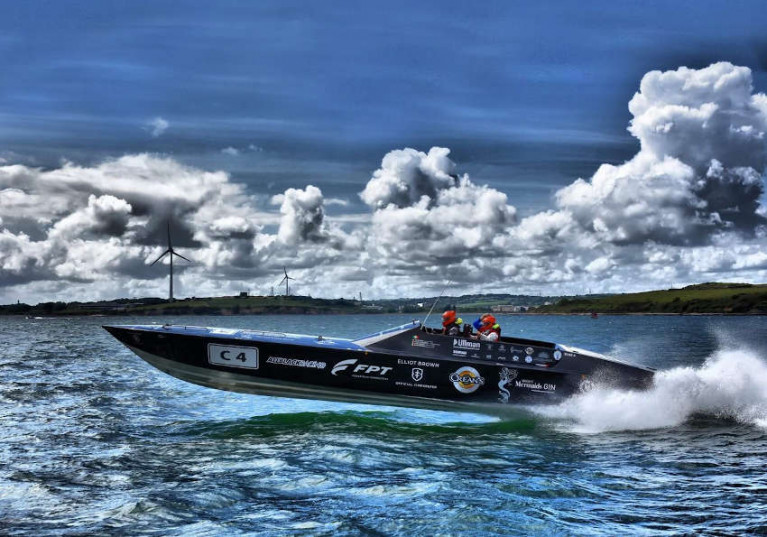Displaying items by tag: International Power Boat Festival
Cork Harbour will play host to four major, and very different, powerboat events over the weekend of 11 and 12 July.
Previously announced last autumn, the International Power Boat Festival, which is a first for Ireland, is part of the Cork300 events series which celebrates the tricentenary of the oldest yacht club in the world, the Royal Cork.
Four major powerboat events will take place during the festival — three of which will be held in Ireland for the first time while the fourth, the Harmsworth Trophy, last took place in Cork 117 years ago and was the first inter-nation powerboat race in the world.
The Royal Cork Yacht Club is inviting a mix of classic boats from the past along with solar and alternative energy boats of the future, and endurance offshore racing boats.
A modern fleet of endurance offshore racing boats will also compete for the honour of being crowned UIM Offshore Marathon World Champion.
To honour Alfred C Harmsworth and those who established the original set of rules for the 1903 race, a specially commissioned Nations trophy will also be awarded to the competitors whose nation has the overall best performance across all four classes in the UIM World Championship Offshore race.
In addition, there will be an attempt at the UIM Long Distance Cork-Fastnet-Cork World Record — claimed in 2018 by Irish team Allblack Racing — as well as a classic motorboat rally where you can see classic and alternative energy boats.
Colin Morehead, chair of Cork300 and Admiral of the Royal Cork Yacht Club said: “I am delighted to see the return of powerboat racing to Cork Harbour after many years.
“The Cork300 events series was developed to look back at ‘where it all began’ and celebrate the club and Cork Harbour’s 300 years of history. We are proud to again host milestone historic events like the Harmsworth Trophy after so many years.
“It is incredible to think that Cork hosted the first inter-nation powerboat race in the world. The entries this year will be considerably faster than those which raced in 1903 but the atmosphere and excitement across the harbour will be no less incredible.
“Sustainability is very important to the Royal Cork Yacht Club so we aim to honour the past, present and future of powerboating, and promote the use of alternative energy and classic boats.”
Inviting offshore powerboat racers from around the world to participate in the festival, Admiral Morehead added: “We sincerely hope that as in 1903, this event will be the start of a truly historic future for the sport of offshore racing.”
 Pictured at the launch of the International Power Boat Festival are Colin Morehead, Royal Cork Admiral and Cork300 chair, with Justin McInerney, president of the Irish Powerboat Association; Richard Salaman, trustee, British International Harmsworth Trophy; and UIM council member Denis Dillon
Pictured at the launch of the International Power Boat Festival are Colin Morehead, Royal Cork Admiral and Cork300 chair, with Justin McInerney, president of the Irish Powerboat Association; Richard Salaman, trustee, British International Harmsworth Trophy; and UIM council member Denis Dillon
Here’s the line-up of events for the International Power Boat Festival in Cork Harbour:
UIM Offshore Marathon World Championship (11 July)
This event will see a modern fleet of endurance offshore racing boats taking on the waters off the Cork Coast. Competition for the UIM World Championship Endurance Marathon 2020 will take place over two races. Weather permitting, both races will be held on the same day.
- Race 1: From Cobh to Mizen Head, around the iconic Fastnet Lighthouse and back to Cork Harbour (136 nautical miles).
- Race 2: From Cork Harbour heading east to Capel Island and back to Cork Harbour (65 nautical miles).
British International Harmsworth Trophy (11 July)
In honour of the Royal Cork Yacht Club hosting the inaugural race for the historic Harmsworth trophy in 1903, the trustees of the trophy will bring it back to its birthplace in Cork. The Royal Cork will once again host a series of races for those competitors determined to get their names inscribed beside some of the legends within offshore international racing.
The event will run alongside the UIM World Championship and will truly be an offshore challenge (total distance 201 nautical miles).
UIM Long Distance Cork-Fastnet-Cork world record (12 July)
The UIM Long Distance World Record for Cork-Fastnet-Cork awaits any team that wishes to take on the challenge. It is presently set at 2 hours, 6 minutes and 47 seconds. In order to set a new record, any team taking on this challenge has to go from Cork Harbour to the Fastnet Rock and back to Cork Harbour, a total distance of 115.2 nautical miles, in a faster time. Those achieving this will not only be honoured with a UIM world record but also get their names inscribed on the All-Black FPT Challenge Trophy.
Classic Motor Boat Rally (12 July)
A classic motor boat rally will take place on Sunday 12 July. In honour of the Royal Cork’s hosting of the inaugural Harmsworth Cup Race in 1903, the course will be similar to the original Harmsworth course from the 1903 Royal Cork Yacht Club building in Cobh (now the Sirius Arts Centre) to Cork city via Blackrock Castle on the River Lee.
Fleet Review
There will be a fleet review for all Royal Cork and visiting yachts/craft with the Admiral and Flag Officers of the yacht club and other dignitaries between two of the former club premises on Haulbowline Island and Cobh. There will be a few surprises on the day and everyone participating in the International Power Boat Festival is encouraged to participate in what will be a fitting spectacle to celebrate where it all began.
Other events taking place this summer for Cork300 include the eye-catching Glandore Classic Regatta; the historic Kingstown/Queenstown race from Dun Laoghaire to Cobh; the world-famous annual Volvo Cork Week regatta, a Wild Atlantic Way sailing ‘cruise in company’ for visiting yacht clubs; and a gathering of naval ships in Cork city.
The prestigious Morgan Cup, awarded by the Royal Ocean Racing Club (RORC), will also come to Ireland for the first time as part of Cork300. See Cork300.com for more, and click HERE to register your interest in Cork300 events.





























































